|
It was a sunny but cold day in October. Twenty young men in long, dark habits knelt in the big, roomy church. The melody of the old organ, played by an invisible musician, echoed through the building. That melody was unknown to me. On that day, I believed that every corner of that church and my heart were full of the melody of glory. I was one of the twenty men kneeling near the altar who had received from the hands of a priest the big silver cross. It was attached to a ribbon that was a black as coal. This was the act of my eternal sacrifice to God. In my shaking hands, I held the crucifix of the One to whom I promised to be a member of the Society of the Catholic Apostolate. I promised chastity, poverty, obedience, perseverance, the sharing of resources, and the spirit of service. I remember noticing that it was like a wedding: the melody of that song had some similarity to a wedding song, although it is possible that it was just the melody of my heart... After one year in the priesthood, I was completely immersed in pastoral work. Holy Mass, catechesis, and long lines to the confessional before Christmas and Easter filled me with happiness. Often when having conversations with people, I would ask them who Jesus was for them. Once, when I met a classmate from school, she asked what made me decide to become a priest. I tried to explain to her that it was a calling to follow God and to explain the happiness that I had in my heart. However, the more I tried to explain to her, the more I understood the weakness of my arguments to a non-believer. After that conversation, the question that Jesus made to the apostles “Who do you say that I am?” often appeared in my mind. Who is that One to whom I offered my life in the Pallottine community? I was the assistant to the parish priest near my hometown, and I was also a chaplain in a neuropsychiatric clinic where there were more than 200 men with different mental disabilities. I thought that I was used to the unusual situations that sometimes happened during Holy Mass: interruptions, babies with smiles on their faces, spontaneous and childish simple questions that they asked. However, there were still many things I was not used to, like the young burdened man at the clinic who touched the cross that I sometimes wear and asked me, “Who is that man?” I was a little confused by his question and tried to give him a simple answer—I just said that he was my friend. This answer was enough for the young man, because he understood the concept of friendship. His nurse Anna and caretaker Julia, who suffered with him in his illness, embodied friendship for him. Then I noticed that my answer was not just an answer to his question, but also to my own. “Who do you say that I am?” Friendship—this is one word with which I can describe my consecrated life. Friendship is not easy because it implies relationship, maturation, and a constant internal struggle with selfishness. I have noticed that in arduous times in my life the voice of my Friend can be heard more strongly. I have heard that voice many times throughout my Pallottine life. Maybe it was the voice of that invisible musician who played the melody in my heart while I first held the big silver cross in my hands during my final vows. I know that this voice has been calling me to bring the words of His Gospel to many different people and areas, which sometimes are very dangerous and unpredictable. I believe that—like the melody in that church where I was kneeling near the altar with my confreres—my consecrated life gains new notes, changes, and rhythms each day. It is not possible to change the melody. I just try to hear the voice of the Eternal Master, the invisible musician, for whom I have consecrated my life in the melody of His glory. This year, we celebrate World Day for Consecrated Life on February 2. For more resources to guide you through vocational discernment, please click here. To learn more about St. Vincent Pallotti and Pallottine spirituality, please click here.
0 Comments
In my prayer life recently, God has been speaking to me a lot about obedience. Obedience to Him, to my family, to my job, to my responsibilities. Perhaps it is because I’m not very good at some of my responsibilities, or maybe it is a call to become more in tune with and to pray for God’s will.
In today’s Gospel (Mark 1:40-45), Jesus heals a man who comes to him asking to be cleaned of his leprosy. Upon healing him completely, Jesus says, “See that you tell no one anything, but go, show yourself to the priest and offer for your cleansing what Moses prescribed; that will be proof for them” (Mark 1:44). Instead, the man “began to publicize the whole manner” where it made it “impossible for Jesus to enter a town openly” (Mark 1:45). How often are we disobedient like this man? How often has Jesus told us something that we missed completely? How often have we placed our desires and actions above what God wills for us? By his choice to disobey Jesus, instead of exalting God, the healed man exalts himself. The Catechism tells us that “sin sets itself against God's love for us and turns our hearts away from it” and that sin is “opposed to the obedience of Jesus.” When the healed man ignored Jesus’ directions, it furthered him from fully understanding God’s love and mercy for him. For us, too, when we sin and choose to follow our will over the Lord’s, we distance ourselves from God’s love. How can we know God’s will for us? It is not always so easily stated to us as it was to the man who was healed of his leprosy. To know God’s will, we must pray with open and patient hearts. Pope Francis recommends that we pray for the desire to follow God’s will, to know his will and to follow it. The saints are also great models of teaching us to pray and love God’s will for us. They are in complete union with Jesus in heaven because they learned to desire, love, and follow God’s will for them throughout their earthly lives. Look to any saint, and they will show you obedience. For example, St. Maximilian Kolbe was martyred, taking the place of a man who was to be killed in Auschwitz. Before that, his writings show that his prayer life was repeatedly focused on knowing the will of God. St. Maximilian Kolbe said, “Obedience is the one and the only way of wisdom and prudence for us to offer glory to God... Let us love our loving Father with all our hearts. Let our obedience increase that love, above all when it requires us to surrender our own will. Jesus Christ crucified is our sublime guide toward growth in God’s love.” St. Maximilian Kolbe’s words and sacrifice point us towards obedience, and teach us that obedience helps us to grow in God’s love. So perhaps my prayers that are revealing obedience as a theme are leading me to stretch my heart to know and share God’s love. Through obedience, I can know Christ’s peace and mercy—the same love he felt when the man with leprosy came to him; the same love he felt when he died on the cross. It is my prayer that as the desire for obedience touches my heart, you too may know the love and joy that comes from asking God to desire his will, know his will, and follow his will. Questions for Reflection: What are some ways you can grow in obedience to God’s will this year? Are there any saints who inspire you by their willingness to follow Christ? Alyce Shields is a teacher in Washington, D.C. Usually at this point during Lent I am looking forward to the Feast of St. Joseph as a brief respite from my Lenten sacrifices. However, this year his Feast Day is on Palm Sunday weekend. With this early timing, it is easy for us to forget about his Feast Day. While more than a week away, I wanted to take some time to reflect on Joseph and remind ourselves of the example he serves for us each and every day. Today’s Gospel (Jn 5:1-16) describes one of Jesus’ miracles in which he commands a man to “Rise, take up your mat, and walk.” Without question the man stands up, picks up his mat, and walks away telling others of the good news. This man had no reason to trust Jesus or even think that he could ever walk again, but he believed and he obeyed. This reminds me of St. Joseph who, without question, listened to God’s call. Without question, Joseph stood by Mary and Jesus as husband, father, and protector. God asks nothing less of us in our own lives and Lent is a perfect time to reflect on whether we are listening to God’s call to “believe and obey.” We can start by going to confession. An examination of conscience can help us to see where we are not believing and obeying, while confession also gives us that clean slate that we so desperately need in order to hear God’s voice in our lives. Once we have prepared ourselves to receive God’s word, we are able to more fully align our hearts to Christ and follow in his footsteps. But this is not an easy thing to do. We will go to confession many times over the course of our lives so that we can once again learn to “believe and obey.” But this is not something that we have to do alone. Not only do we have Christ and the entire Catholic Church on our side, we also have the saints. In particular, St. Joseph is a beautiful example of living a life of faith and obedience to the will of God, as evidenced by his willingness to follow God’s plan even when he didn’t know the outcome. If we learn to live our lives as he did, then I guarantee we will continue to move closer to Christ. As I mentioned before, the Feast of St. Joseph is two weekends from now. I encourage you to look to him for guidance and strength during your Lenten journey. His silent faith, his dedication to the Holy Family, and his role in forming and raising the Son of God gives us a wonderful example by which to form ourselves to Christ and to believe and obey without question. As we approach his Feast Day, I also invite you to join me in praying a novena to St. Joseph that we may learn to silence our hearts and listen to the Word of God during this Lenten season. This nine-day series of prayers helps us to focus our minds and hearts on specific intentions and invites St. Joseph in a special way to intercede for us. Click here to join me in praying the novena to St. Joseph. “Let us allow ourselves to be filled with St. Joseph’s silence!” -Pope Emeritus Benedict, Angelus, December 2005 Nicholas Shields is a Young Professional in Washington, D.C
Until recently, I had this perception that to serve God in a day job, someone had to work directly in religious life or work as a missionary. I thoroughly enjoy my day job in communications, but couldn’t help wondering if what I was doing ultimately served God. I searched the Internet for ways to see God in the day-to-day struggles of work-life balance. Through my search and prayer, I realized that working in an ethical environment that fit with my morals and values was the first step to seeing how my work served God. After reflection, I also saw how the words I used and the promotional or informative materials I designed inspired and educated others. God gives us all unique talents to grow and develop, as mentioned in The Parable of the Talents in Matthew. I believe my communications role allows me to strengthen my gifts in thinking creatively and working quickly and efficiently, while helping me to be a positive voice in my work environment. Here are some inspirational points I keep in mind while working in a nine-to-five career. 1. “Work becomes worship when you dedicate it to God and perform it with an awareness of his presence.” –Rick Warren, The Purpose Driven Life A secular view removes God from our work. However, God wants to be a part of our work. He calls us to use our unique talents for others. This helps to reveal to us why we are important and what we are called to do. We can each bring honor and glory to God in our own way by using these unique talents in whatever work we do. Some ideas:
2. “Slaves, be obedient…as to Christ, not only when being watched, as currying favor, but as slaves of Christ, doing the will of God from the heart, willingly serving the Lord and not human beings, knowing that each will be requited from the Lord for whatever good he does, whether he is slave or free.” – Ephesians 6:5-8 Regardless of the type of work we do, God is our ultimate employer. Following God’s plan for our work is what gives it legitimacy. Just as Adam and Eve were given the task of taking care of God’s creation before they sinned, so too were we created to do God’s work of maintaining and providing for His creation. It’s important to remain ethical in our daily tasks. When we are tempted to gossip, be grumpy, or give into peer pressure, we must remind ourselves that God calls us to act above those enticements. 3. “Those to whom God gives riches and property, and grants power to partake of them, so that they receive their lot and find joy in the fruits of their toil: This is a gift from God. For they will hardly dwell on the shortness of life, because God lets them busy themselves with the joy of their heart.” – Ecclesiastes 5:18-19 Serving God in our work completely depends on our attitude. We are called to be joyful in our work. This is made easier when we remember that we are ultimately serving others through our work. If there’s a menial or stressful task ahead, think of the people who benefit from your service. 4. “I am the vine, you are the branches. Whoever remains in me and I in him will bear much fruit, because without me you can do nothing.” – John 15:5 God wants to be invited into every area of our lives, and much of our lives are spent doing work. Though we may attain monetary success or be productive in the workplace, if our work does not have God as its foundation, it is stripped of its transcendent meaning. Including God in our daily lives is a sign of humility. Try asking for God’s help throughout the day or during an important meeting or project. 5. “In every way I have shown you that by hard work of that sort we must help the weak, and keep in mind the words of the Lord Jesus who himself said, ‘It is more blessed to give than to receive.’” – Acts 20:35 While we work to earn a living and provide for our families, we are also called to be generous to our neighbors in need. After all, it is because of God’s blessings that we have the ability to take care of ourselves. We are, again, called to take care of all God’s creation. Some ways we can take care of God’s creation include: • Reflecting on what your God-given talents are, and seeking ways to put your talents to work by serving your community. • Seeking to respect life in all forms – the environment, human life from conception to natural death, and other living animals. • Finding ways to live simply and not be wasteful; recycle. • Offering to help others in your office – if a coworker is on a tight deadline, ask them how you can assist in your role. • Saving a portion of your monthly budget for charity, including church tithing. You never know when a service opportunity presents itself – and now, you’ll have a budget you can pull from! 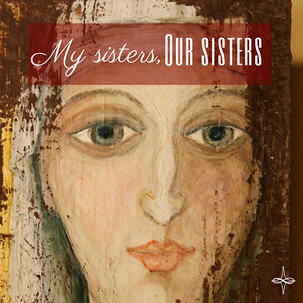 I was going to write this as a reflection on the life of Saint Clare, given her feast day is this week (August 11) and that there are so many interesting facts and stories about her life. Then a different, but related, reflection came to mind… Seven years ago, being a relatively recent convert to Catholicism, I had no idea who the Poor Clares were. However, I gained some new “sisters” when I started a diocesan two-year faith development program that year and was fortunate enough to have two Poor Clare nuns of the Order of St. Clare (OSC) in my class. The Poor Clares take vows of poverty, obedience, chastity, and enclosure and are followers of St. Francis and St. Clare of Assisi, living the simple, Gospel life in an enclosed contemplative community. The variety of Poor Clare expressions includes the Order of St. Clare (OSC), the Colettine Poor Clares (PCC), Capuchin Poor Clares (OSC Cap), and Poor Clares of Perpetual Adoration (PCPA). No matter the expression though, the Poor Clare life of prayer is possible because they do live in community. I am now profoundly involved with the Monastery of St. Clare in Great Falls, Montana and count the nuns of the Poor Clares of Montana, who I affectionately call my sisters, amongst my dearest friends. My sisters have taught me a few things… Sisters Maryalice, Catherine, Jane, and Judith Ann all came to Great Falls 16 years ago at the invitation of the Bishop of the Diocese of Great Falls-Billings, who wanted to bring a monastic presence to the state of Montana. Each sister came from a separate monastery of the Holy Name Federation of Poor Clares along the eastern seaboard. I did not know the sisters then, but I am in awe at their courage, tenacity, and conviction to pull-up their roots and move west to this beautiful, but unknown land, to start the first monastic presence in Montana. They did not know each other well, had never lived in Montana, and had no monastery to occupy. I have moved around a lot in my life, but my horizon was never as uncertain and rocky as was the horizon for these four amazing women. Their story on starting the first monastery in Montana echoes St. Clare, who ran away from her familiar surroundings, wealthy family, and pending marriage in 1212 to join St. Francis in a life dedicated to God. My sisters, you have taught me to trust God’s providence, discern God’s call, and follow that call with all my heart no matter how difficult the road ahead seems. In the time that I have known them, the Poor Clares of Montana have faced numerous, varying tribulations, and in each of those situations, they relied on the power of prayer (ok, no surprise there, that is their vocation – to pray, to pray with and for all of God’s people). Witnessing the sisters’ trials brings to mind St. Clare herself who faced many struggles including years of difficulty in obtaining papal approval of the form of life she and her sisters lived, a life she called “the privilege of highest poverty.” The effect of St. Clare’s prayers also come to mind as her prayers are credited with obtaining victories in turning back invaders of Assisi as well as numerous healings. My sisters, your witness to the power of prayer and reliance on Divine Providence have helped me to deepen my prayer life and ultimately my relationship with Christ. Each Poor Clare community is unique as each monastery is autonomous while expressing the Poor Clare spirit of evangelical poverty, prayer, and contemplation, and the nuns of the Poor Clares of Montana reflect St. Clare’s charisms in their own exceptional way. As a small community (the same four who were the foundresses here 16 years ago are the same four who are the community today), each nun has an enormous workload to keep the monastery running as well as to try to grow her community all while keeping her emphasis on enclosure and prayer. You would think enclosure would ensure a level of certainty, but each day is distinctive for these women. Yet, somehow, the sisters maintain their prayerful focus. What they encounter in the work of each day, likely, is not very different from what St. Clare went through in starting the Order of Poor Ladies of San Damiano over 800 years ago – all the responsibility initially falls on a few until the community can grow. My sisters, you have taught me no matter what each day brings to rely on Christ and persevere through prayer. The Poor Clares of Montana recently started offering contemplative prayer workshops and Christian meditation prayer groups, bringing the Catholic Church’s rich Desert tradition of prayer to the local laity. I am amazed that these women (all who have been involved with prayer for decades longer than I have) continue to expand and deepen their relationship with Christ by embracing various expressions of prayer, adding to their repertoire of vocal and silent prayer methods. I am reminded of St. Clare’s words, “Gaze upon Christ, consider Him, contemplate Him, as you desire to imitate Him.” My sisters, you have shown me the power of praying silently in a group as a way of cultivating my relationship with Holy Trinity, as a way of responding to God’s presence in the world. My sisters live for God alone, dedicating their whole being to God in a life expressed in community, silence, solitude, and prayer. I am grateful for their prayer, their presence, and the peace that they bring me as well as the whole community of God’s people. The Monastery of St. Clare in Great Falls is the only monastery in the state of Montana, but like the dozens of Poor Clare Monasteries in North America and the over 900 in the world, the Poor Clare nuns, following in the footsteps of St. Clare, are here for all of us – my sisters are our sisters. Thanks be to God. Fawn Waranauskas teaches in the Catholic Catechesis Certificate Program for Saint Joseph’s College Online.
This blog post was first published on August 9th on the St. Joseph’s College of Maine Theology Faculty Blog. Click here to learn more about our cooperative alliance with St. Joseph’s College Online. Today we celebrate the Solemnity of the Blessed Virgin Mary, Mother of God. As I thought about the many lessons we can learn from our Blessed Mother, I found myself particularly drawn to wondering what it means to be a woman of faith. I’m sure there are many others who have pondered this same idea. Sometimes, I think about how the 21st century seems to illuminate women through a lens of conformity, threatening our truest femininity with negative connotation and making it seem “okay” to expect less of ourselves and of others. Many young women are faced with the struggles of understanding themselves according to how others perceive them, never knowing how to love themselves for who they really are.
Women are faced with the struggles of figuring out what it means to be a woman. We are told in different ways all around us that we are not smart enough or too intimidating, that we are not thin enough or too fat, to flaunt ourselves is to respect ourselves, in order to “get a man” we need to do x, y, and z. I offer a different perspective: womanhood is beautiful and blessed thing that proves we are the crown of creation by God the Father. My role as a Catholic woman is to support and love those around me with unfailing resilience and without ceasing. In the Catholic Church, there is one woman who rose above all difficulties and strife because she said, “Yes.” Mary the Mother of God is a perfect model of holiness and willful obedience to God, and a shining example to womanhood. When betrothed to a man she loved, she faced persecution and rejection from those around her. She knew others would judge her and they would criticize her, but she held true to her “Yes” and bore the Son of God. In our lives, what do we do when others look at us with disgust or with judgments? Can we not choose the higher road and be the person God wants us to be, regardless of what others may think of us? Mary certainly did. It is hard to swim opposite the current at times. Standing up for our virtue is something that most women find difficult or have never heard of before. As a woman of faith, I know that my responsibility to God and to myself is to love Him and love myself. God knows my most intimate thoughts and feelings and he will never leave me. When I’m feeling alone, disappointed, discouraged, scared, or disrespected there will always be one who will stand by me until the end, and that one is Jesus. What does it mean to be a woman of faith? It means to love above all else, understand that you are a precious creation, and that you are loved dearly by God himself. Krissy Kirby is a teacher for the Archdiocese of Washington. “In the world there is often a lack of joy. We are not called to accomplish epic feats or to proclaim high-sounding words, but to give witness to the joy that arises from the certainty of knowing we are loved, from the confidence that we are saved”
(Rejoice! (Letter in Preparation for the Year of Consecrated Life), n. 3) Last month, on the feast day of St. Ignatius of Loyola, Pope Francis went for lunch at the Generalate of the Jesuits. As I reviewed the pictures from his visit, joy and happiness are very evident. He appears very comfortable and relaxed with them, even though he may not know them well individually. Why is he comfortable? As a member of a religious community, I think that I can venture an answer. He is among those who shared a similar formation as he did as a member of the Society of Jesus. Technically, he formally ended his time as a Jesuit when he became a bishop. Bishops cannot be under the authority of the superior of a religious community. They can, though, ask to continue to use the religious initials of their community as well as wear the habit. Cardinal O’Malley, the Archbishop of Boston, continues to use the initials of the religious community that he came from, the Capuchin Franciscans, as well as wear the habit. Many religious communities even officially continue to count bishops among their membership. Some might think this strange, but the reality is that once a person is part of a religious community, it is part of who that person is and how the person approaches God, life, ministry. When you share a common formation and lifestyle from a relatively young age, that formation does not simply go away. It is a lifestyle that one freely chooses and it forms and informs the person. Once committed to, consecrated life (cf. Catechism of the Catholic Church, n. 913-933) is not something that can easily be cast aside. Even those who have left religious communities often continue to live the spirituality of that community as a single or married person or diocesan priest. I have seen it time and time again. Twenty-eight years ago today, I made my First Consecration of Promises as a member of the Society of the Catholic Apostolate (Pallottine Fathers and Brothers). Our six promises of poverty, chastity, obedience, sharing of resources, spirit of service, and perseverance have provided me with a way, within the context of our community life, to live the charity of Christ. I make no claim to live it perfectly, but I try to live it as authentically as possible. The way that I live more authentically is through the assistance of the members of my community who “urge me on” to live more fully in Christ’s love. This summer, more than most, I have had to even more deeply reflect on the quality of my life as a member of the Society. Am I living as an apostle, as St. Vincent Pallotti called all to do, reviving faith and rekindling charity? Have I fully surrendered, given, and offered myself to God, as the form of consecration of my religious community challenges me to do? If not, then why not? These questions have been very much on my mind as I form, with the help of God, a new member of the Society who began Postulancy only a few days ago. Thirty years ago last month, I did the same and have grown and developed spiritually and otherwise in ways that I would have never thought or imagined. As I work in formation with our Postulant, Brandon, I try to teach, but once again God causes me to learn and for that I am full of gratitude and joy. Pray for those in consecrated life, especially as the Church prepares for the Year of Consecrated Life that will begin this coming Advent! Fr. Frank Donio, S.A.C., is Director of the Catholic Apostolate Center and teaches for Saint Joseph’s College Online. This blog post was first published on August 17th on the St. Joseph’s College of Maine Theology Faculty Blog. Click here to learn more about our cooperative alliance with St. Joseph’s College Online “Then God said, ‘Let Us make man in Our image, according to Our likeness; and let them rule over the fish of the sea and over the birds of the sky and over the cattle and over all the earth, and over every creeping thing that creeps on the earth.’ God created man in His own image, in the image of God He created him; male and female He created them. God blessed them; and God said to them, ‘Be fruitful and multiply, and fill the earth, and subdue it; and rule over the fish of the sea and over the birds of the sky and over every living thing that moves on the earth.’ … God saw all that He had made, and behold, it was very good” (Genesis 1:26-28, 31).
From this exaltation we begin our reflection on Father’s Day. Many countries set aside the third Sunday of June in honor of both fathers and fatherhood. It’s usually the time when dads are shown the appreciation of their families for all their love, protection, devotion, guidance, caring, wisdom, teaching, entertainment, discipline (ouch), cooking, support, shuttling around, mentoring, coaching, and/or generosity. It’s a totally fair trade-off but also no secret: fatherhood demands much of a man. Unfortunately, not all are blessed to have a father in their lives, and there are many circumstances which contribute to this. Thankfully, God Himself has provided a model for human fatherhood, someone who He entrusted His own Son to during the crucial formative years of Jesus’ human life: St. Joseph. We look to Saint Joseph as the perfect example of paternity, as he was given the honor of being the guardian of the Holy Family. St. Joseph is not directly quoted in scripture, but what about his actions? Do they speak louder than his words (or lack thereof)? It seems that Joseph’s most frequent biblical deed besides traveling is something men can easily relate to— sleeping before taking action (see Matthew 1:20 and 2:13)... but surely there must be more to being a father than this!? Of course there is! To me, being a true (Christian) father means being a Christ-like man who bears witness to the perfect love of God, and who is a virtuous man to his children, spouse, and to all he encounters. We hear a lot about Mary’s hugely consequential “Yes” (see Luke 1:38) to the Father’s will at the Annunciation and how this is the Blessed Mother’s complete giving of herself to God. In his own soft-spoken way, though, Joseph also gave his own “Yes” and similarly submitted himself to the will of God. Even with the extraordinary circumstances of his betrothed’s pregnancy, Joseph, in the end, places his trust in the divine will and accepts the paternal role God offers him as part of His plan. Like Mary, Joseph selflessly placed whatever desires and plans he had for his future second to what he had now been called to become— Jesus’ guardian and protector. It is this obedience that makes Joseph such a worthy role model for all men. Being righteous (see Matthew 1:19), Joseph knew he did not have all the answers; let alone the experience, for the fatherhood he was being called to. Instead, he stepped aside in faithful acceptance of God’s will. As Saint John Paul II so beautifully put it: What emanates from the figure of Saint Joseph is faith. Joseph of Nazareth is a “just man” because he totally “lives by faith.” He is holy because his faith is truly heroic. Sacred Scripture says little of him. It does not record even one word spoken by Joseph, the carpenter of Nazareth. And yet, even without words, he shows the depth of his faith, his greatness. Saint Joseph is a man of great spirit. He is great in faith, not because he speaks his own words, but above all because he listens to the words of the Living God. He listens in silence. And his heart ceaselessly perseveres in the readiness to accept the Truth contained in the word of the Living God. We see how the word of the Living God penetrates deeply into the soul of that man, that just man. (St. John Paul II, Daily Meditations) This past weekend we celebrated Father’s Day, and whether the father in our lives is a biological one, a father figure, or wears a Roman collar, take the time this week to personally thank both he and God for the impact he’s had on your life. Fatherhood is no easy task and is not for everyone, but the love that flows from this holy calling comes directly from Abba God, “our Father in heaven” (Matthew 6:9-13)! May we be obedient to and cherish these men at all times! Thomas Wong is an undergraduate at The Catholic University of America currently studying abroad in Rome, Italy. Growing up in a large Catholic family gave me the opportunity to interact with the Catholic Church’s love for Mary and the Saints. However, looking back just recently, it is no surprise that my appreciation of Mary came to being as I grew in a deeper appreciation of my own mother. I tell people that I would be content if I were a fraction of the person that she is. While I could go on forever about how wonderful my mother is, I’ll limit myself to just sharing one characteristic of her that I think is crucial for understanding and appreciating Mary as the Mother of God: when I go to my mom for advice, she will always end the conversation suggesting that I pray about it and ask God for the necessary virtues to make an action or decision. By asking me to pray about it, she helps me direct my attention toward Christ.
You may or may not have this same experience with your own mothers, but Mary is the Mother of God, making her Our Mother as well. We all have the opportunity to approach Mary’s open arms in the hope of receiving her comfort and love. But even more importantly, she is able to point us to Christ, to encourage us to grow our relationship with her Son. Look at scripture and you can see where Mary helps guide people to Christ. In particular, look at the Wedding at Cana, for instance, in John 2. Mary and Jesus were at a wedding, and the hosts ran out of wine. Mary went to Jesus and told him that they were out of wine and were in need of more. Jesus responded to her, "Woman, what is that to me and to you? My hour is not yet come." Mary did not really respond to this. Instead, she went to the waiters and told them, "Do whatever He tells you." Her remark shows that she knew that He was about to perform a miracle. She knew that he would fulfill her request. Jesus instructed the servants to fill some huge jugs with water. Because of Mary's advice they obeyed. Think about this now: Mary told Christ what the servants needed, and she then immediately told the servants to do as Jesus tells him. Does Mary not tell Christ our needs, and then instructs us to do as her Son instructs us to do? By going to our Blessed Mother, Mary can help us follow the path to Christ the way she helped the servants obey Jesus. Like the Wedding at Cana, she will tell her Son our needs and then, pointing to her Son, tell us to do as He instructs us. Mary not only directs us towards Christ. Our hearts yearn to be like Mary. This is because Mary fulfilled God’s invitation of perfect love, which allows her to become the person she was meant to be. We have that same calling. While we will not achieve this goal in absolute perfection the way Mary did, we can look to Mary as our human role model for true, authentic Christian love towards God and towards our fellow human being. Mary, being the New Eve of Creation, can directly link us to God. Think about this, if Mary directly brought Christ to the world, then would she directly bring us to Christ through prayer? She is our direct route to growing closer in Christ, as she knew Christ better than anyone else. So maybe like some of our own earthly mothers, Mary is our role model and our guide towards holiness. Andrew St. Hilaire is the Assistant to the Director of the Catholic Apostolate Center St. Joseph is known as the Shadow of the Eternal Father, the Perpetual Adorer, the Patron of the Universal Church, the Patron of the Suffering and Dying, the True Foster Father of Jesus Christ, and Most Chaste Spouse of the Ever-Virgin Mary. He shows how a person must rely on the Father’s providence, trust the boldness of the Holy Spirit, and cherish the Incarnate Jesus, all while staying close to the Virgin Mary. St. Joseph is a model of faith and in a unique way he upholds the dignity of all vocations.
Joseph survives and thrives as a person of faith by abandoning his life and family completely to God. The Devil, Herod, and everyday difficulties, like not being able to find a place for his wife to give birth, threaten Joseph’s most precise gifts. A faithful person humbly resigns what they care about most to the Giver of All Gifts only to receive back what is best blessed and renewed. Joseph protects his family through surrendering them to God. How wonderful St. Joseph’s prayers must have been. The way he took his fears and insecurities to God to receive true strength must have been so beautiful. There are many ways that we know that St. Joseph’s faith was profound. The Virgin Mary knows for sure that she has never been with a man, but Joseph does not. St. Joseph trusted in the words of an angel in a dream. The angel said, “Joseph, son of David, do not be afraid to take Mary home as your wife, because what is conceived in her is from the Holy Spirit” (Mt. 1:20). Catholic theology of the Trinity had not been developed yet leaving Joseph not knowing with any sort of clarity who this “Holy Spirit” was that had impregnated his fiancée. St. Joseph demonstrates that his faith is not the kind that limits God by being attached to personal plans and expectations, but is one that allows God to act boldly. His faith is fulfilled by being lived out; he did take Mary as his bride, he did raise Jesus as his son, he did go wherever the Lord commanded him. Joseph fled to Egypt when Jesus’ life was being threatened and he returned home when he was told, doing everything in accordance with God’s will and timing. The obedient Joseph, as the Perpetual Adorer of the Christ-child can also help us grow in intimacy with Christ. Have we ever realized that the baby Jesus was most likely birthed into the callused hands of his carpenter foster-father? St. Joseph knew Jesus in a radically unique and intimate way. Joseph was able to adore the Eucharist while it was still breathing. We can relate to Joseph in the struggles that he faced and the fact that he was not spared from original sin. He was broken, flawed, sinful, fearful, and even being tempted. Joseph, as most chaste spouse, did not reduce Mary to an object of pleasure but he honored her as a whole person. We can imagine that Joseph embraced his call to chastity not begrudgingly but with great joy. Their intimacy honors the glory of creation by neither of them trying to dominate or manipulate the other for personal gain. How immaculate their interactions must have been! St. Joseph and Mary model for us a pure intimacy rooted in trust, commitment, and the will of God. With these considerations in mind we see St. Joseph as an inspiration for all people because he was called to marriage, parenthood, and celibacy. Whether we are called to marriage, religious life, priesthood, or the single-life we should entrust ourselves to St. Joseph and know that he understands the burdens that we carry. As a good father he will teach us to trust God completely and to allow the Holy Spirit to move in dramatic and unexpected ways. With Joseph as a model of faith we will honor the dignity of all people, love Mary, and intimately adore the Incarnate Christ. Daniel Hoover works at St. Mary’s Parish in the Diocese of Wilminigton, DE as a Lay Ecclesial Minister. |
Details
Archives
July 2024
Categories
All
|
About |
Media |
© COPYRIGHT 2024 | ALL RIGHTS RESERVED

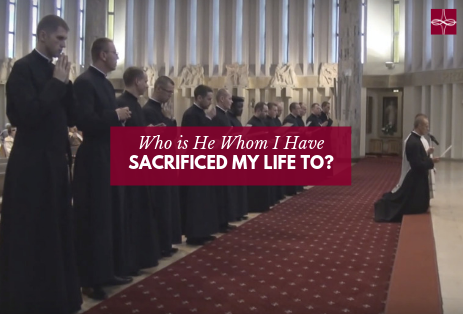
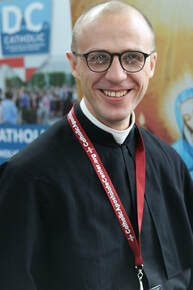

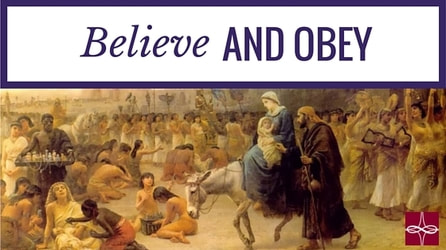



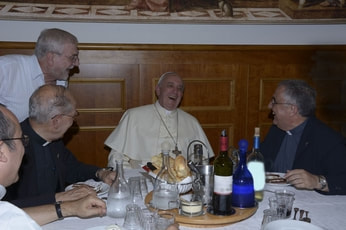
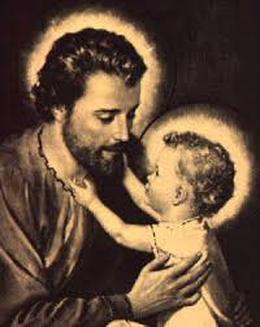
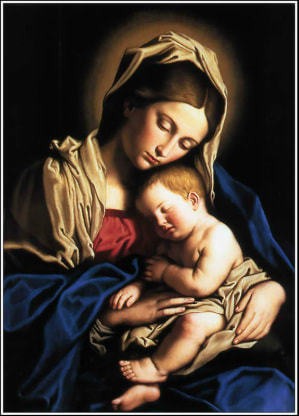

 RSS Feed
RSS Feed